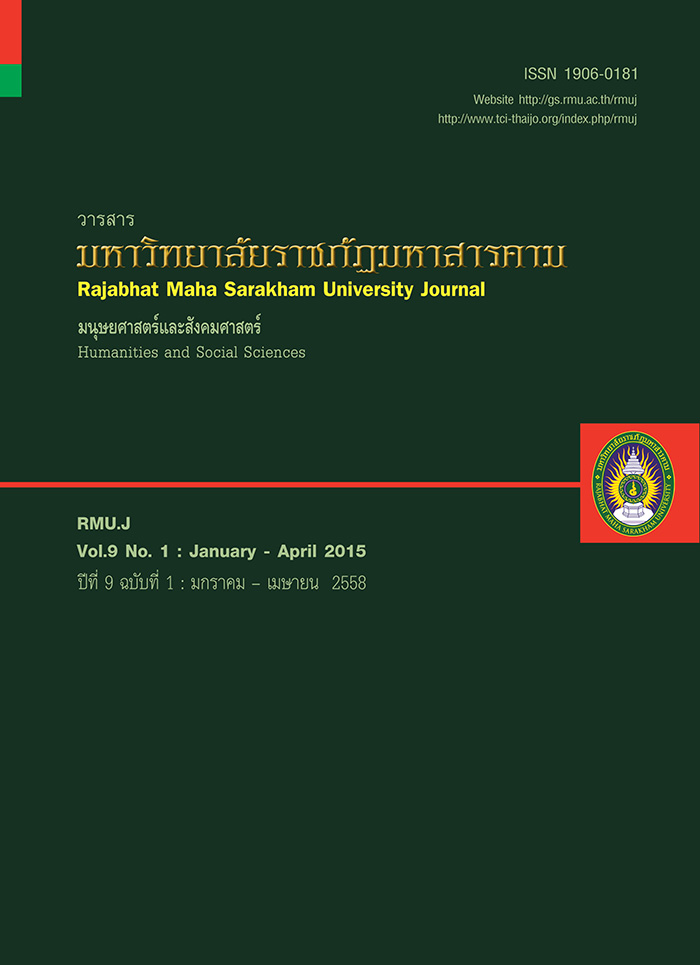เบญจสุขภาวะชุมชน เพื่อการพัฒนาท้องถิ่นตามหลักปรัชญาเศรษฐกิจพอเพียง ของชุมชนบ้านเม่นใหญ่ อำเภอเมือง จังหวัดมหาสารคาม;Five Public Health Principles for Local Development Based on the Philosophy of Sufficiency Economy in Men Yai Village, Muang District, Maha
Main Article Content
บทคัดย่อ
การวิจัยครั้งนี้มีวัตถุประสงค์ ประการแรก เพื่อศึกษาปรากฏการณ์เบญจสุขภาวะชุมชน (สภาพภาวะความสุขในการดำรงชีวิต
ของคนชุมชนบ้านเม่นใหญ่ ใน 5 มิติ ประกอบด้วย ร่างกาย จิตใจ สังคม สติปัญญา และสิ่งแวดล้อม) เพื่อพัฒนาท้องถิ่นตามหลัก
ปรัชญาเศรษฐกิจพอเพียงของชุมชนบ้านเม่นใหญ่ อำเภอเมือง จังหวัดมหาสารคามตั้งแต่อดีตจนถึงปัจจุบัน ประการที่สอง การจัด
การชุดความรู้ของภูมิปัญญาท้องถิ่นที่เกี่ยวกับเบญจสุขภาวะชุมชน เพื่อการพัฒนาท้องถิ่นตามหลักปรัชญาเศรษฐกิจพอเพียงของชุมชน
บ้านเม่นใหญ่ ประการที่สาม รูปแบบการพัฒนาเบญจสุขภาวะชุมชน เพื่อการพัฒนาท้องถิ่นตามหลักปรัชญาเศรษฐกิจพอเพียงของ
ชมุ ชนบา้ นเมน่ ใหญ ่ และประการทีส่ ี่ ผลการใชร้ ปู แบบการพฒั นาเบญจสขุ ภาวะชมุ ชน เพือ่ การพฒั นาทอ้ งถิน่ ตามหลกั ปรชั ญาเศรษฐกจิ
พอเพียงของชุมชนบ้านเม่นใหญ่ อำเภอเมือง จังหวัดมหาสารคาม มีกลุ่มเป้าหมาย ประกอบด้วยกลุ่มภูมิปัญญาท้องถิ่นที่มีชุดความรู้
ด้านสุขภาวะด้วยหลักเศรษฐกิจพอเพียง จำนวน 6 คน และกลุ่มคนที่สนใจพัฒนาสุขภาวะด้วยหลักเศรษฐกิจพอเพียง จำนวน 10 คน
ดำเนินการวิจัยแบบผสานวิธี (Mixed methodology) ผลการวิจัย พบว่า
1. ปรากฏการณ์เบญจสุขภาวะชุมชนเพื่อพัฒนาท้องถิ่นตามหลักปรัชญาเศรษฐกิจพอเพียงของชุมชนบ้านเม่นใหญ่ อำเภอเมือง
จังหวัดมหาสารคาม อดีตคนในชุมชนดำรงชีวิตที่เกื้อกูลกับธรรมชาติ มีทรัพยากรที่อุดมสมบูรณ์ คนในชุมชนอยู่แบบเครือญาติ พึ่งพา
อาศัยซึ่งกันและกัน ส่งผลให้คนในชุมชนมีสุขภาวะที่ดี เมื่อชุมชนเข้าสู่ยุคโลกาภิวัตน์มีความเจริญทั้งด้านการคมนาคม ด้านสาธารณูปโภค
ส่งผลให้คนในชุมชนเปลี่ยนแนวทางดำเนินชีวิตจากวิถีเดิม ทั้งการทำมาหากิน การดำเนินชีวิต การสร้างความสัมพันธ์กับชุมชนการอยู่
ร่วมกันแบบเครือญาติก็เริ่มห่างเหินใช้ชีวิตแบบครอบครัวโดดเดี่ยวมากขึ้น ใช้เงินเป็นตัวขับเคลื่อนการดำเนินชีวิตที่มีความรีบเร่ง
วิถีชีวิตดั้งเดิมถูกค่านิยมที่ทันสมัยมาเปลี่ยนแปลง ความเป็นอยู่ที่อาศัยภูมิปัญญาในการดำเนินชีวิต ภายใต้ธรรมชาติแปรเปลี่ยนไป
เป็นชีวิตที่รีบเร่งส่งผลต่อการมีสุขภาวะที่ดีของคนในชุมชนลดลง สวนกระแสกับความเจริญ ทำให้สุขภาวะชุมชน ด้านร่างกาย
ด้านจิตใจ ด้านสติปัญญา ด้านสังคม ตลอดจนเรื่องของสภาพสิ่งแวดล้อมในชุมชน
2. การจัดการชุดความรู้ของภูมิปัญญาท้องถิ่นที่เกี่ยวกับเบญจสุขภาวะชุมชนเพื่อการพัฒนาท้องถิ่น ตามหลักปรัชญาเศรษฐกิจ
พอเพียง ของชุมชนบ้านเม่นใหญ่ อำเภอเมือง จังหวัดมหาสารคาม ภูมิปัญญาท้องถิ่นจะมีการจัดการความรู้ด้านสุขภาวะ โดยการได้รับ
ความรู้จากบรรพบุรุษ ผ่านการถ่ายทอดการดำเนินชีวิตจริงในครอบครัว ในเครือญาติ หรืออาจจะได้รับการถ่ายทอดจากกคนในชุมชน
มีการสร้างองค์ความรู้ของตน สามารถที่จะนำองค์ความรู้นั้นไปพัฒนาสุขภาวะของตนทั้งด้านกาย ด้านจิตใจ ด้านสติปัญญา ด้านสังคม
และดา้ นสิง่ แวดลอ้ ม กลายเปน็ ความร้ทู ี่ฝงั ลกึ สามารถถา่ ยทอดองคค์ วามรู้ ไปสบูุ่คคลอื่น เมื่อถงึ ยคุ ปจั จุบัน มคี วามเจรญิ ทางดา้ นวัตถุ
The objectives of the research were 1) to investigate the condition of five public health principles
(conditions of happiness in daily life of the people in Banmenyai community in five dimension: baby, mind,
social, intelligent and environment) for local development based on the Philosophy of Sufficiency Economy
in Men Yai Village, Muang District, MahaSarakham Province from the past to present, 2) to explore the
knowledge management of the public health principles for local development based on the Philosophy of
sufficiency Economy in Men Yai Village, 3) to design a five-principle-based-model for public health development
based on the Philosophy of Sufficiency Economy in Men Yai Village, and 4) to assess the outcomes of the
model implementation. The target groups were composed of six members of local wisdom group who used
the five-principle-based model for public health development and ten participants who were interested in the
public health development project. The mixed methodology was employed for the research. The research
findings showed that:
1. Three models of the public health development were composed of a Thai traditional lifestyle model,
a culture/tradition-based model, and a religion-based model. There were five activities in each model. The
activities were I-sarn traditional dinner, man and way of life, Loi Kratong activity, asking the help of friend for
growing rice, herbal group and saving water buffalo project. Each activity consisted of 5 steps: building faith,
thoughts, intelligence, work and new life.
2. Regarding the model implementation, it was found that the average level of the model efficiency
assessed by the experts was high (Mean 4.24), the herbal activity affected mostly and significantly the
mental public health development . The Loi Krathong activity affected mostly the environment of public health
development. I-sarn dinner, man and way of life, asking for help of friend for growing rice affected mostly and
significantly the intellect of public health development. These activities were frequently performed and people
learned and gain knowledge from the activities, and they were able to apply their knowledge appropriately
to their daily life.
Article Details
1. บทความที่ลงตีพิมพ์ทุกเรื่องได้รับการตรวจทางวิชาการโดยผู้ประเมินอิสระ ผู้ทรงคุณวุฒิ (Peer Review) สาขาที่เกี่ยวข้อง อย่างน้อย 3 ท่าน ในรูปแบบ Double blind review
2. ข้อคิดเห็นใด ๆ ของบทความที่ลงตีพิมพ์ในวารสารมหาวิทยาลัยราชภัฏมหาสารคาม นี้เป็นของผู้เขียน คณะผู้จัดทำวารสารไม่จำเป็นต้องเห็นด้วย
3. กองบรรณาธิการวารสารมหาวิทยาลัยราชภัฏมหาสารคาม ไม่สงวนสิทธิ์การคัดลอกแต่ให้อ้างอิงแสดงที่มา


